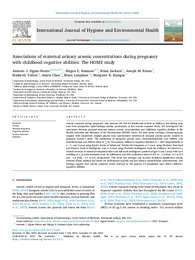Título :
Associations of maternal urinary arsenic concentrations during pregnancy with childhood cognitive abilities: The HOME study |
Autor :
Signes-Pastor, Antonio Jose 
Romano, Megan 
Jackson, Brian 
Yolton, Kimberly 
Chen, Aimin 
Lanphear, Bruce 
Karagas, Margaret R  |
Editor :
Elsevier |
Departamento:
Departamentos de la UMH::Salud Pública, Historia de la Ciencia y Ginecología |
Fecha de publicación:
2022 |
URI :
https://hdl.handle.net/11000/30795 |
Resumen :
Arsenic exposure during pregnancy may increase the risk for intellectual deficits in children, but limited data exist from prospective epidemiologic studies, particularly at low arsenic exposure levels. We investigated the association between prenatal maternal urinary arsenic concentrations and childhood cognitive abilities in the Health Outcomes and Measures of the Environment (HOME) Study. We used anion exchange chromatography coupled with inductively coupled plasma mass spectrometry detection to measure arsenic species content in pregnant women’s urine. The summation of inorganic arsenic (iAs), monomethylarsonic acid (MMA), and dimethylarsinic acid (DMA) refers to ΣAs. We assessed children’s cognitive function (n = 260) longitudinally at
1-, 2-, and 3-years using Bayley Scales of Infant and Toddler Development, at 5 years using Wechsler Preschool and Primary Scale of Intelligence, and at 8 years using Wechsler Intelligence Scale for Children. We observed a modest decrease in mental development index and full-scale intelligence quotient at ages 3 and 5 years with each
doubling of ΣAs with estimated score (ß) differences and 95% confidence interval (CI) of -1.8 from - 4.1 to 0.5 and - 2.5 from - 5.1 to 0.0, respectively. This trend was stronger and reached statistical significance among children whose mothers had lower iAs methylation capacity and low urinary arsenobetaine concentrations. Our findings suggest that arsenic exposure levels relevant to the general US population may affect children’s
cognitive abilities.
|
Palabras clave/Materias:
Arsenic
Neurodevelopment
Cognitive abilities
In utero exposure
Children |
Tipo de documento :
info:eu-repo/semantics/article |
Derechos de acceso:
info:eu-repo/semantics/openAccess
Attribution-NonCommercial-NoDerivatives 4.0 Internacional |
DOI :
hhttps://doi.org/10.1016/j.ijheh.2022.114009 |
Aparece en las colecciones:
Artículos Salud Pública, Historia de la Ciencia y Ginecología
|

 La licencia se describe como: Atribución-NonComercial-NoDerivada 4.0 Internacional.
La licencia se describe como: Atribución-NonComercial-NoDerivada 4.0 Internacional.
.png)